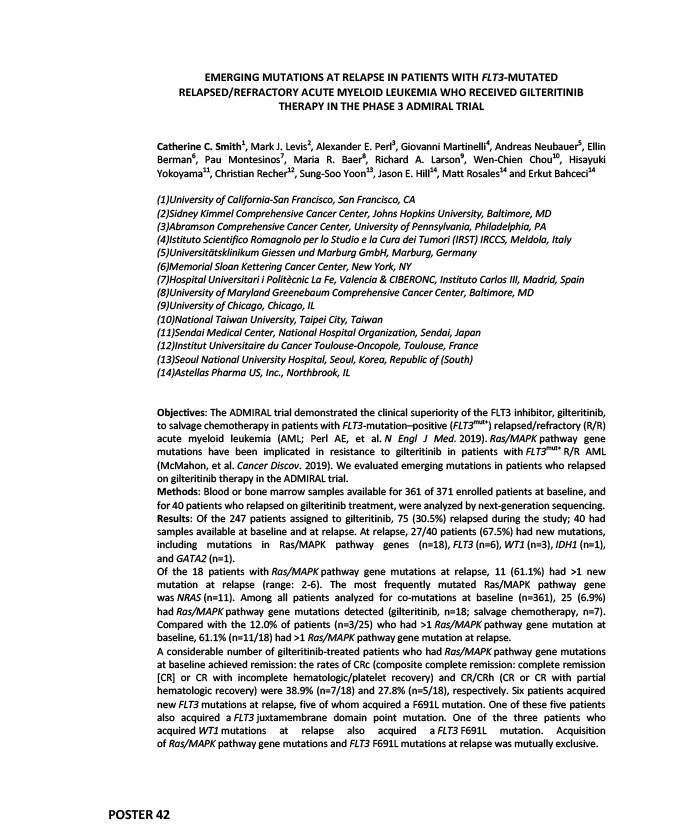
POSTER 42
EMERGING MUTATIONS AT RELAPSE IN PATIENTS WITH FLT3-MUTATED
RELAPSED/REFRACTORY ACUTE MYELOID LEUKEMIA WHO RECEIVED GILTERITINIB
THERAPY IN THE PHASE 3 ADMIRAL TRIAL
Catherine C. Smith1, Mark J. Levis2, Alexander E. Perl3, Giovanni Martinelli4, Andreas Neubauer5, Ellin
Berman6, Pau Montesinos7, Maria R. Baer8, Richard A. Larson9, Wen-Chien Chou10, Hisayuki
Yokoyama11, Christian Recher12, Sung-Soo Yoon13, Jason E. Hill14, Matt Rosales14 and Erkut Bahceci14
(1)University of California-San Francisco, San Francisco, CA
(2)Sidney Kimmel Comprehensive Cancer Center, Johns Hopkins University, Baltimore, MD
(3)Abramson Comprehensive Cancer Center, University of Pennsylvania, Philadelphia, PA
(4)Istituto Scientifico Romagnolo per lo Studio e la Cura dei Tumori (IRST) IRCCS, Meldola, Italy
(5)Universitätsklinikum Giessen und Marburg GmbH, Marburg, Germany
(6)Memorial Sloan Kettering Cancer Center, New York, NY
(7)Hospital Universitari i Politècnic La Fe, Valencia & CIBERONC, Instituto Carlos III, Madrid, Spain
(8)University of Maryland Greenebaum Comprehensive Cancer Center, Baltimore, MD
(9)University of Chicago, Chicago, IL
(10)National Taiwan University, Taipei City, Taiwan
(11)Sendai Medical Center, National Hospital Organization, Sendai, Japan
(12)Institut Universitaire du Cancer Toulouse-Oncopole, Toulouse, France
(13)Seoul National University Hospital, Seoul, Korea, Republic of (South)
(14)Astellas Pharma US, Inc., Northbrook, IL
Objectives: The ADMIRAL trial demonstrated the clinical superiority of the FLT3 inhibitor, gilteritinib,
to salvage chemotherapy in patients with FLT3-mutation–positive (FLT3mut+) relapsed/refractory (R/R)
acute myeloid leukemia (AML; Perl AE, et al. N Engl J Med. 2019). Ras/MAPK pathway gene
mutations have been implicated in resistance to gilteritinib in patients with FLT3mut+ R/R AML
(McMahon, et al. Cancer Discov. 2019). We evaluated emerging mutations in patients who relapsed
on gilteritinib therapy in the ADMIRAL trial.
Methods: Blood or bone marrow samples available for 361 of 371 enrolled patients at baseline, and
for 40 patients who relapsed on gilteritinib treatment, were analyzed by next-generation sequencing.
Results: Of the 247 patients assigned to gilteritinib, 75 (30.5%) relapsed during the study; 40 had
samples available at baseline and at relapse. At relapse, 27/40 patients (67.5%) had new mutations,
including mutations in Ras/MAPK pathway genes (n=18), FLT3 (n=6), WT1 (n=3), IDH1 (n=1),
and GATA2 (n=1).
Of the 18 patients with Ras/MAPK pathway gene mutations at relapse, 11 (61.1%) had >1 new
mutation at relapse (range: 2-6). The most frequently mutated Ras/MAPK pathway gene
was NRAS (n=11). Among all patients analyzed for co-mutations at baseline (n=361), 25 (6.9%)
had Ras/MAPK pathway gene mutations detected (gilteritinib, n=18; salvage chemotherapy, n=7).
Compared with the 12.0% of patients (n=3/25) who had >1 Ras/MAPK pathway gene mutation at
baseline, 61.1% (n=11/18) had >1 Ras/MAPK pathway gene mutation at relapse.
A considerable number of gilteritinib-treated patients who had Ras/MAPK pathway gene mutations
at baseline achieved remission: the rates of CRc (composite complete remission: complete remission
CR or CR with incomplete hematologic/platelet recovery) and CR/CRh (CR or CR with partial
hematologic recovery) were 38.9% (n=7/18) and 27.8% (n=5/18), respectively. Six patients acquired
new FLT3 mutations at relapse, five of whom acquired a F691L mutation. One of these five patients
also acquired a FLT3 juxtamembrane domain point mutation. One of the three patients who
acquired WT1 mutations at relapse also acquired a FLT3 F691L mutation. Acquisition
of Ras/MAPK pathway gene mutations and FLT3 F691L mutations at relapse was mutually exclusive.